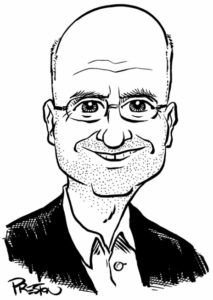Considering that the Free Press’ editorial positions were very liberal, reflecting the nature of a very liberal Vermont community, one might think that meetings with Sanders were cordial, even celebratory.
They weren’t. Sanders was always full of himself: pious, self-righteous and utterly humorless. Burdened by the cross of his socialist crusade, he was a scold whose counter-culture moralizing appealed to the state’s liberal sensibilities as well as its conservatives, who embraced his gun ownership stance, his defense of individual rights, an antipathy toward big corporations and, generally speaking, his stick-it-to-them approach to politics.
My most memorable encounter with Sanders was during an editorial board session during a period when the Vermont Progressive Party was reconstituting itself to challenge for more seats on the Burlington City Council.
Sanders had been mayor of Burlington from 1981 until 1989, institutionalizing progressive government in the city and other Vermont enclaves. Although he has been in Washington since his election to the House of Representatives in 1991, he remained the titular head of the movement, yet refused to endorse a progressive slate seeking City Council seats or the new leadership orchestrating the campaigns.
After discussing his favorite issues — corporations, government reform, health care and the like, I asked about his unwillingness to endorse his fellow progressives. He said it wasn’t his role. I suggested voters might expect him to weigh in. He disagreed, clearly annoyed at the persistent questioning. Finally I suggested that he had a larger moral responsibility to the progressive movement.
At which point he jumped out of his seat, told me to go f*** myself and stormed out of the edit board meeting. OK, maybe my persistence bordered on hectoring. But I felt he ought to provide an honest answer. My suspicion was that he resented others for assuming his mantle of progressive leadership and wouldn’t acknowledge them.
He returned to the meeting about five minutes after the outburst and we continued to discuss issues of the day.
The candidate you see on television working crowds, shaking hands and even smiling has undergone a presidential campaign conversion. And there is no doubt that Sanders is a smart, deft politician riding a popular, populist wave. But what is real?
I’m not alone in my opinions about Sanders. Chris Graf, long-time Associated Press bureau chief in Vermont, in an article published Sept. 30 in Theweek.com, had this to say about the senator.
“Bernie has no social skills, no sense of humor, and he’s quick to boil over. He’s the most unpolitical person in politics I’ve ever come across,” Graf said. Others who have covered Sanders agree.
Seven Days, the lively alternative weekly in Burlington, is offering extensive coverage of the Sanders campaign, reporting framed by decades of coverage. A recent article by Paul Heintz titled “Anger Management” featured current and former staff who have experienced the dark side of Sanders.
“They characterize the senator as rude, short-tempered and, occasionally, downright hostile. Though Sanders has spent much of his life fighting for working Vermonters, they say he mistreats the people working for him,” Heintz wrote. Among those he cited was Steve Rosenfeld, Sanders’ press secretary during his 1990 House campaign, and author of “In Making History in Vermont.”
“At his best, Sanders is a skilled reader and manipulator of people and events,” Rosenfeld wrote in his account of the campaign. “At his worst, he falls prey to his own emotions, is unable to practice what he preaches (though he would believe otherwise) and exudes a contempt for those he derides, including his staff.”
In the clubby media/political Vermont government bubble examples of Sanders’ sour temperament and moralizing abound. His response to my challenges was perhaps a bit extreme, but not by much. He is a polarizing politician and proud of it; as Woody Allen put it in “Annie Hall”: “But for the left.”
That’s not good enough. The rigid, uncompromising ideology of the Orwellian-named Republican Freedom Caucus in the U.S. House of Representatives has helped paralyze government. Its members won’t even compromise with the more pragmatic members of the party, preferring no loaf rather than a half.
Republicans will continue to control the House after the 2016 election. The Democrats have a chance to regain control of the Senate. Split government again. That the parties are unwilling, or at least unable, to work together accounts for the public’s astounding low opinion of Congress. Add a president as unyielding as Sanders to the political mix and we may look back at the current Congress as the good times.
Which is too bad, because Sanders’ positions are really good, progressive and would help Americans. He’d just be really bad advancing them.
 BY
BY